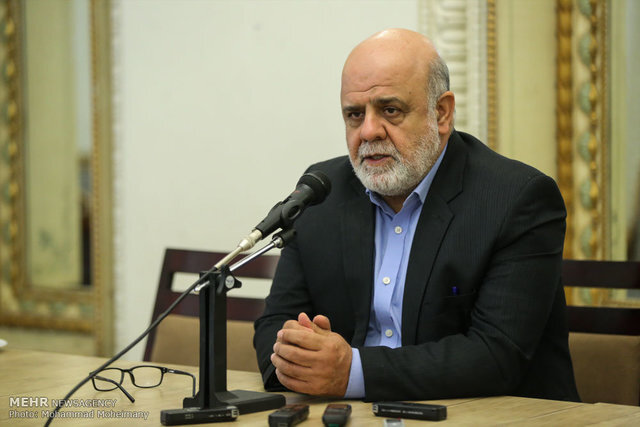A U.S. return to JCPOA will help settle current crisis: diplomat

TEHRAN - Iraj Masjedi, the Iranian ambassador to Baghdad, has said that a U.S. return to the 2015 nuclear deal, known as the JCPOA, will help settle the current crisis between Iran and United States peacefully.
“The Islamic Republic of Iran has always sought peaceful solutions. We have never been interested in war, tension and intensification of crisis. We have always believed in peaceful solutions which can be realized if the U.S. returns to the JCPOA,” Ambassador Masjedi told Aljazeera, ISNA reported on Wednesday.
He added, “The peaceful way to peacefully settle this crisis is a U.S. return to the JCPOA and termination of sanctions and pressure and the economic war against Iran.”
Washington has no other choice, because Iran negotiates with no one under sanctions and pressure, the ambassador remarked.
In an interview with NBC News aired on Tuesday, Iranian Foreign Minister Mohammad Javad Zarif said the room for negotiations is “wide open” if U.S. President Donald Trump lifts sanctions against Iran.
“The U.S. has always had sanctions on Iran, it’s unfortunately addicted to sanctions, but there have been sanctions that have been imposed since President Trump came to office. Once those sanctions are lifted then room for negotiations is wide open,” he said.
Zarif added, “We are at the bargaining table. It is the United States that left the bargaining table. And they’re always welcome to return. Provided that they are willing to live by. The U.S. can go back to implementing its obligations and come back to the bargaining table.”
In an interview with BBC Radio 4 published on July 12, Mohamed ElBaradei, the former head of the International Atomic Energy Agency, described Trump’s decision to withdraw from the nuclear deal when it was “working” as “lacking rationale, legal basis and any common sense”.
ElBaradei said that the U.S. is applying waterboarding method to Iran by exerting economic pressure on the country.
He added, “No country is going to cooperate under these humiliating conditions.”
Kim Darroch, the former British ambassador to the U.S., has referred to Trump's 2018 decision to withdraw from the nuclear deal as "diplomatic vandalism", suggesting that the decision was made because the president disliked that the agreement was signed by his predecessor, President Barack Obama, the Daily Mail reported on Saturday, citing leaked diplomatic cables.
Darroch reportedly suggested that Trump's disdain for Obama, "personality reasons," was a primary motivator behind the withdrawal.
President Hassan Rouhani said on July 12 that the U.S. sanctions against Iran constitute examples of “crime against humanity and economic terrorism” because they have targeted ordinary people’s “lives and needs”.
Rouhani also said that the U.S. policy of exerting pressure against Iran has been defeated.
“Today, nobody doubts that the U.S. anti-Iran plots, which began last year with the sanctions aiming at making people disappointed about the system, has completely failed,” he said.
He noted that the U.S. sought to isolate Iran, however, it failed and made itself insolated.
NA/PA
Leave a Comment